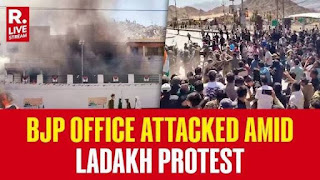*Ladakh: A Story of Dreams Fulfilled and Disappointments Created*
When Article 370 was abrogated on *5th August 2019*, the people of Ladakh celebrated like never before.
For decades, Leh and Kargil had lived under the shadow of Jammu and Kashmir’s politics, often reduced to a mere “postscript” in official letters and policy discussions.
Educational opportunities were dismal — there was no higher education in Leh, forcing students to travel hundreds of kilometers to Jammu.
Jobs were scarce because the vast majority of posts went either to Kashmiri Muslims or to Jammu Dogras.
For the first time in history, Ladakh felt recognized when the *BJP granted Union Territory status*. It was nothing short of a dream come true. The wild celebrations across Leh and other parts of Ladakh symbolized the trust and goodwill the people had placed in the BJP and Prime Minister Narendra Modi’s leadership.
*The Slide from Hope to Discontent*
But within a few years, the tide has turned completely. The *absence of an elected legislature* in a Union Territory meant that governance fell entirely into the hands of the *Lieutenant Governor (LG)*. What Ladakhis saw as liberation from Kashmiri domination gradually turned into frustration under bureaucratic high-handedness. Local issues — employment, land rights, safeguards under the Sixth Schedule, protection of culture and environment — were either mishandled or ignored.
The result? A region that once stood firmly behind BJP is now slipping away. Yesterday’s violent incident where the *BJP office was burnt down* is not just a law-and-order problem; it is a *political warning bell*.
The fact that the Congress, once the most disliked party in Ladakh, is now finding space again shows how badly the ground situation has been mismanaged.
*The Sonam Wangchuk Factor*
Environmental activist Sonam Wangchuk, once celebrated for his innovations, has now become a rallying figure for the disgruntled. His decision to attend a *climate conference in Pakistan* raises very serious national security and political concerns.
Why is he being allowed to openly challenge India’s sovereignty narratives under the garb of climate activism?
If intelligence inputs suggest his activities are being misused against India, *why has there been no timely action*?
This isn’t merely about one activist; it reflects a governance vacuum. When people find no answers from the administration, they gravitate toward voices of dissent, even if such voices are problematic from a national interest perspective.
*Lessons for BJP*
The Ladakh story is a classic example of how *strategic victories can be squandered through tactical failures*. The BJP had delivered to the Ladakhi people something unimaginable — direct recognition and autonomy from Kashmir’s dominance.
But without *timely corrective measures, local empowerment, and political accountability*, the goodwill has evaporated.
It raises hard questions:
* Why is the LG administration not held accountable for repeated lapses?
* Why is *local self-rule through an elected body* being delayed indefinitely?
* Why is the Centre not acting decisively against individuals who may be conspiring against India?
*The Road Ahead*
Ladakh is strategically critical — it borders both Pakistan and China. Discontent here cannot be dismissed as just another regional protest. The situation demands *swift, decisive, and sensitive action* from the BJP. If corrective measures are not taken now, the party risks losing a region where it once enjoyed unprecedented trust.
BJP needs to remember: *people’s dreams once fulfilled can turn into people’s anger once betrayed.* Ladakh is a test case. The rest of the nation is watching.
-- Dayanand Nene
25/9/25
.jpeg)
.jpeg)
Comments
Post a Comment